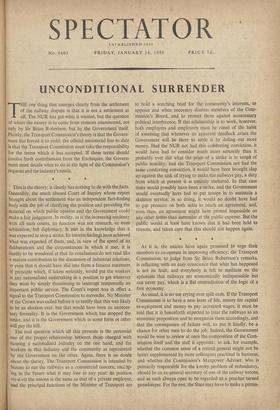This is the theory; it clearly has nothing to do
with the facts. Ostensibly, the much abused Court of Inquiry whose report brought about the settlement was an independent fact-finding body with the job of clarifying the position and providing the material on which public opinion and the Government could make a fair judgement. In reality, as is the increasing tendency with all such courts, its function was not research, or even arbitration,' but diplomacy. It met in the knowledge that it was expected to stop a strike. Its interim findings have achieved what was expected of them, and, in view of the speed of its deliberations and the circumstances in which it met, it is hardly to be wondered at that its conclusions' do not read like a mature contribution to the discussion of industrial relations, or even that it should have slid into them a fatuous statement of principle which, if taken seriously, would put the workers in any nationalised undertaking in a position to get whatever they want by simply threatening to interrupt temporarily an important public service. The Court's report was in effect a signal to the Transport Commission to surrender. No Minister of the Crown was called before it to testify that this was likely to be an election year, but that would have been an unneces- sary formality. It is the Government which has stopped the strike, and it is the Government which in some form or other will pay the bill.
The real question which all this presents is the perennial one of the proper relationship between those charged with running a nationalised industry on the one hand, and the workers in that industry and the community as represented by the Government on the other. Again, there is no doubt about the theory. The Transport Commission is intended by Statute to run the railways as a commercial concern, recz-ip- ing in the future what it may lose in any year; its position vis-a-vis the unions is the same as that of a private employer, and the principal functions of the Minister of Transport are to hold a watching brief for the community's interests, to appoint and when necessary dismiss members of the Com- mission's Board, and to protect them against unnecessary political interference. If this relationship is to work, however, both employers and employees must be cured of the habit of assuming that whenever an apparent deadlock arises the Government will be there to settle it by doling out more money. Had the NUR not had this comforting conviction, it would have had to consider much more seriously than it probably 'ever did what the price of a strike is in terwi of public hostility; had the Transport Commission not had the same comforting conviction, it would have been brought slap up against the task of trying to make the railways pay, a duty from which at present it is entirely sheltered. In that case there would possibly have been a strike, and the Government would eventually have had to put troops in to maintain a skeleton service; in so doing, it would no doubt have had to put pressure on both sides to reach an. agreement, and, even then, an agreement might have proved impossible on any other terms than surrender at the public expense. But the public would at least have known that it had been held to ransom, and taken care that this should not happen again.
*


































 Previous page
Previous page